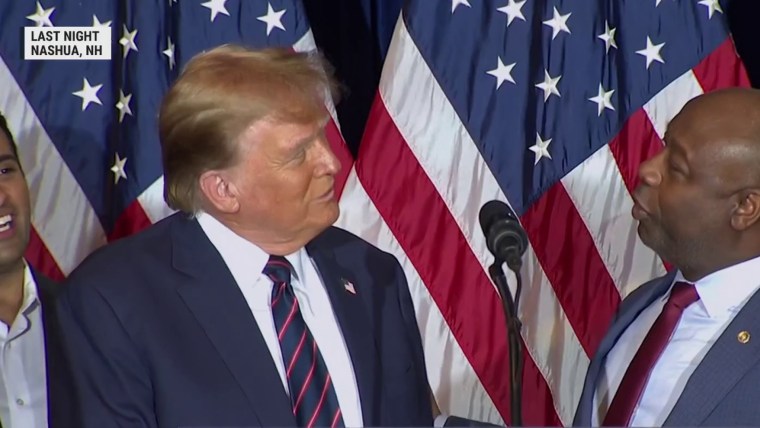Authoritarian politicians are fragile and insecure creatures, always looking over their shoulders to see who is after them. To build themselves up and deter potential challengers, they take others down in public, letting them know exactly where they stand. They apply this same vicious treatment even to their most loyal collaborators, so that no one ever feels safe and thus everyone continues to act in a slavish manner. Throughout history, such leaders have never lacked a steady supply of opportunists and profiteers who are all too willing to play this game, even to the detriment of their dignity. The Donald Trump-era GOP is the latest example.
Trump has used ritual humiliation to make the GOP his personal tool, and the list of Republicans he has mocked publicly is long. In classic autocratic tradition, the more submissive Republican elites are with Trump — supporting him through impeachments, indictments and a coup attempt that sent them running for their lives — the more he openly scorns them, losing few opportunities to cut them down.
Scott has been performing self-abasement spontaneously, likely to Trump’s delight.
When Sen. Tim Scott, R-S.C., the former GOP presidential candidate, showed up at Trump’s victory rally after a January campaign stop in New Hampshire, he might have thought he would earn points. Instead, Trump scorned him: “Did you ever think [Haley] actually supported you, Tim?” a smirking Trump said, referring to Nikki Haley’s pledge to support Trump if he becomes the GOP nominee. “And you’re the senator of her state. ... You must really hate her,” Scott’s response? “I just love you,” he told Trump.
“That’s why he’s a great politician,” Trump declared with a self-satisfied smile.
Since then, Scott has been performing self-abasement spontaneously, likely to Trump’s delight. “I’m far better encouraging and being excited and motivated for President Trump than I was for myself,” Scott said after voting in the South Carolina primary. And at the post-primary rally, he assured the audience that he would keep his speech short because “the longer I speak, the less you hear of him.”
Scott might seem to win the award for bowing and scraping. But his fellow senator from South Carolina, Lindsey Graham, is giving him some stiff competition. Graham is forever paying for the sin of criticizing Trump in 2016. “If we nominate Trump, we will get destroyed......and we will deserve it,” Graham tweeted in May 2016; he also called Trump “a race-baiting, xenophobic religious bigot.”

Scholars use the term “hollowed out” to describe institutions that lose their independence in autocracies when they have been purged of anyone who is not loyal to the leader. But individuals who collaborate with authoritarians can end up hollowed out, too, bereft of their morals and their self-esteem. This is what has happened to Graham.
Graham is a former military lawyer and national security hawk (including on Russia), but his main cause now seems to be defending Trump, to the point of reversing his view expressed after Jan. 6 that presidential conduct is subject to American law. Since that opinion clashed with Trump’s claim that he should have presidential immunity for everything and anything he has done, including inciting an insurrection, Graham’s opinion could not stand.
Politicians who play the leader’s ritual humiliation game may think that if they show him enough public support, at the right moments, their past indiscretions will be forgotten. That is never the case. Even worse, the politician can find that he or she has become the enemy of the leader’s rabid followers, as well.
Though Graham called Trump “the most qualified man to be president,” audience members booed him.
That’s the situation of Graham, booed regularly at Trump rallies by MAGA members, including in his home state, as though all of his slavish behavior to Trump has meant nothing to them. At a July rally with Trump, Graham was jeered and called a “traitor” by the crowd, prompting Trump to give him a halfhearted compliment (“he’s there when you need him”) while also promising the crowd he would get Graham “straightened up.”
And lest there be any doubts that Trump intended this display of debasement, he pulled the same move after Saturday’s South Carolina primary. Though Graham called Trump “the most qualified man to be president,” audience members booed him. The former president, playing the enlightened despot, once again assured his minions that “I love him, he’s a good man.”
Scott may have mastered the philosophy of ritual humiliation — I am nothing, my leader is everything, and everyone should know it — but Graham’s journey provides the stuff of a morality tale.
As reported by Michael Isikoff and Daniel Klaidman, Graham flipped on Trump when he was forced to testify to a grand jury about a request he made after the 2020 election on behalf of Trump to Georgia’s secretary of state to discard mail-in ballots from several Georgia counties. Graham had dutifully fought the subpoena for months, but after he told the truth, he hugged Fulton County District Attorney Fani Willis and thanked her for the opportunity to testify, saying: “That was so cathartic. I feel so much better.”

Graham knew a grand jury had recommended indicting him in Georgia's election interference case, but this was not just opportunism: His words suggest that his conscience was bothering him. And that’s why he will likely continue to be a target of Trump’s scorn. Trump knows that ritual humiliation breaks down the morale of his enablers, who try so hard to please him but never receive absolute validation and at any moment can be taken down again.
Perhaps one day, the GOP will understand that Trump needs its acclaim and loyalty as much as it needs his and will treat him as the weak and insecure individual he really is. Until then, it will be a willing accomplice in its own humiliation, owned by Trump for all the world to see.

